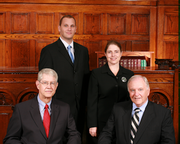Common Misconceptions About Wills - What Your Will Won't Do

Wills are an essential part of effective estate planning, enabling individuals to accomplish their goals and wishes. Parents use these documents to name guardians for their kids and adult children with special needs, and others create wills to leave valuable and sentimental items to family, friends, and charities. However, there are also actions this paperwork can’t do, such as those listed below.
What Your Will Won’t Do
1. Set Out Funeral Plans
As estate planning attorneys often explain to their clients, funerals usually occur days or weeks before wills are located and read. If you put your funeral instructions in a will and nowhere else, these wishes may not be known until the services are over. Instead, write a letter containing your instructions, put it in a secure place apart from the will, and tell someone you trust where it is.
2. Transfer Ownership of Certain Property
 The document works well for leaving personal property and assets that are in your name alone, but some items transfer to new owners outside of wills. For example, if you own real estate in a joint tenancy with right of survivorship, the other person listed on the deed becomes the sole owner when you pass away. Chosen beneficiaries of life insurance policies receive the proceeds, and financial accounts with due on death clauses automatically transfer to the person named.
The document works well for leaving personal property and assets that are in your name alone, but some items transfer to new owners outside of wills. For example, if you own real estate in a joint tenancy with right of survivorship, the other person listed on the deed becomes the sole owner when you pass away. Chosen beneficiaries of life insurance policies receive the proceeds, and financial accounts with due on death clauses automatically transfer to the person named.
3. Avoid Probate
Property that passes to others through a will may have to go through probate, which might take months. Skilled estate planning attorneys will guide you in creating trusts for real and personal property to avoid the process. Wise planning reduces the amount of an estate that passes through probate, and may also lessen your present and future tax liability.
If you’re ready to write a will, turn to the seasoned estate planning attorneys at The Law Offices of Bromm, Lindahl, Freeman-Caddy & Lausterer in Wahoo, NE, to guide you through the process. They offer 125 years of legal experience and quality counsel to clients in the surrounding area. For compassionate advice in estate and probate matters, call (402) 443-3225 to schedule an appointment. Visit their website to learn more about their background and expertise.
About the Business
(5 reviews)
Have a question? Ask the experts!
Send your question

